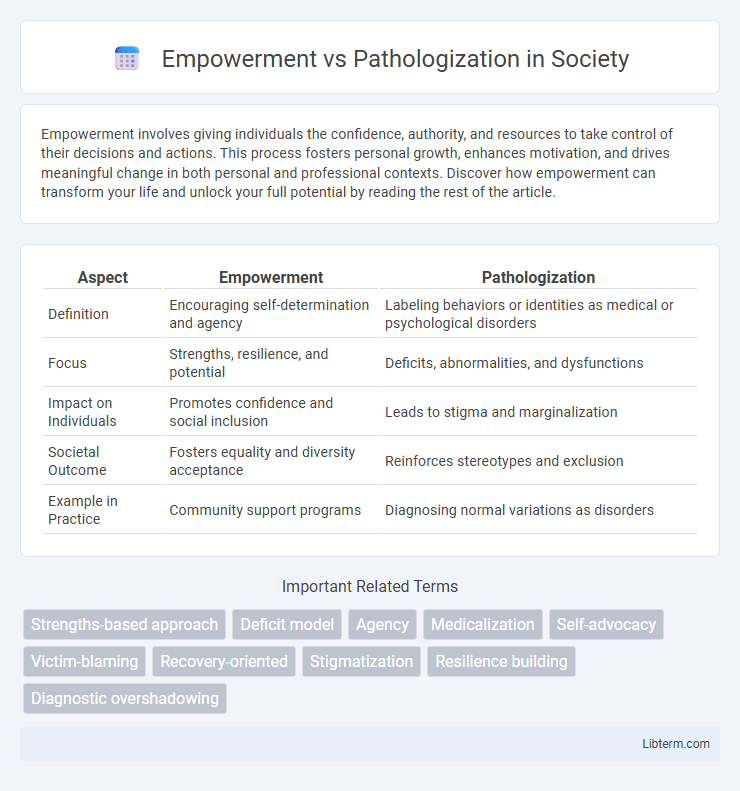Empowerment involves giving individuals the confidence, authority, and resources to take control of their decisions and actions. This process fosters personal growth, enhances motivation, and drives meaningful change in both personal and professional contexts. Discover how empowerment can transform your life and unlock your full potential by reading the rest of the article.
Table of Comparison
| Aspect | Empowerment | Pathologization |
|---|---|---|
| Definition | Encouraging self-determination and agency | Labeling behaviors or identities as medical or psychological disorders |
| Focus | Strengths, resilience, and potential | Deficits, abnormalities, and dysfunctions |
| Impact on Individuals | Promotes confidence and social inclusion | Leads to stigma and marginalization |
| Societal Outcome | Fosters equality and diversity acceptance | Reinforces stereotypes and exclusion |
| Example in Practice | Community support programs | Diagnosing normal variations as disorders |
Understanding Empowerment and Pathologization
Understanding empowerment involves recognizing individuals' strengths, capacities, and agency to make autonomous decisions and improve their well-being. Pathologization, conversely, frames behaviors or conditions primarily as deficiencies or disorders, often leading to stigma and diminished self-worth. Emphasizing empowerment fosters resilience and inclusion, whereas pathologization can result in marginalization and restrict personal growth.
Historical Perspectives on Mental Health Narratives
Historical perspectives on mental health narratives reveal a shift from pathologization, which framed psychological differences as disorders requiring control, to empowerment, emphasizing agency and resilience. Early psychiatric models often marginalized individuals by attributing symptoms to inherent weakness or moral failure, reinforcing stigma. Contemporary approaches prioritize personal strengths, social context, and rights-based frameworks, transforming mental health discourse toward inclusion and self-determination.
Language: The Power to Empower or Pathologize
Language plays a crucial role in shaping perceptions by either empowering individuals or pathologizing them through the words used to describe their experiences. Empowering language fosters dignity, resilience, and agency, while pathologizing language often reinforces stigma, marginalization, and negative stereotypes. Identifying and adopting terminology that highlights strengths rather than deficits transforms societal narratives and promotes inclusive understanding.
Empowerment-Based Approaches in Practice
Empowerment-based approaches in practice prioritize enhancing individuals' control over their lives by fostering self-efficacy, resilience, and agency, which contrasts with pathologization that often labels and limits individuals based on deficits. These approaches utilize strengths-based assessments and collaborative goal-setting, promoting autonomy and social inclusion to improve mental health and well-being outcomes. Evidence from community psychology and social work demonstrates that empowerment strategies reduce stigma, increase engagement in treatment, and support sustainable recovery processes.
Pathologization: Risks and Consequences
Pathologization involves labeling normal variations in behavior or identity as mental disorders, which can result in stigma and marginalization. This approach risks undermining individual autonomy and perpetuating discrimination in healthcare and social systems. Consequences include reduced access to appropriate support, increased psychological distress, and reinforcement of negative stereotypes.
The Role of Media in Shaping Mental Health Perceptions
Media representation significantly influences public understanding of mental health by either promoting empowerment or perpetuating pathologization. Positive portrayals emphasize resilience, recovery, and self-advocacy, fostering destigmatization and encouraging help-seeking behaviors. Conversely, sensationalized or stereotypical coverage risks reinforcing misconceptions, leading to social alienation and hindering effective mental health support systems.
Impact on Individuals and Communities
Empowerment fosters self-efficacy and resilience by encouraging individuals and communities to recognize their strengths and actively participate in decision-making processes that affect their lives. Pathologization undermines agency by framing behaviors or conditions as inherently flawed, which can lead to stigma, marginalization, and reduced access to supportive resources. The impact of empowerment results in improved mental health, social inclusion, and community cohesion, whereas pathologization often exacerbates social inequalities and psychological distress.
Culturally Sensitive Empowerment Strategies
Culturally sensitive empowerment strategies prioritize individuals' strengths and cultural backgrounds, fostering resilience without labeling behaviors as deficits or pathologies. These approaches emphasize community engagement, culturally relevant resources, and validation of diverse identities to promote self-determination and wellbeing. Integrating indigenous knowledge and culturally specific practices enhances empowerment by respecting unique worldviews and mitigating the harmful effects of pathologization.
Moving Beyond Pathologization in Modern Therapy
Modern therapy increasingly emphasizes empowerment by recognizing clients' strengths instead of solely diagnosing deficits. Moving beyond pathologization involves adopting trauma-informed and person-centered approaches that validate individual experiences and promote resilience. This shift fosters holistic well-being, reduces stigma, and supports sustainable mental health recovery.
Fostering Empowerment: Steps Forward
Fostering empowerment involves recognizing individual strengths and promoting autonomy rather than focusing on deficits or limitations, which leads to pathologization. Strategies such as providing access to resources, encouraging self-advocacy, and fostering supportive environments contribute to increased agency and resilience. Emphasizing empowerment over pathologization results in improved mental health outcomes and enhanced social inclusion.
Empowerment Infographic

 libterm.com
libterm.com